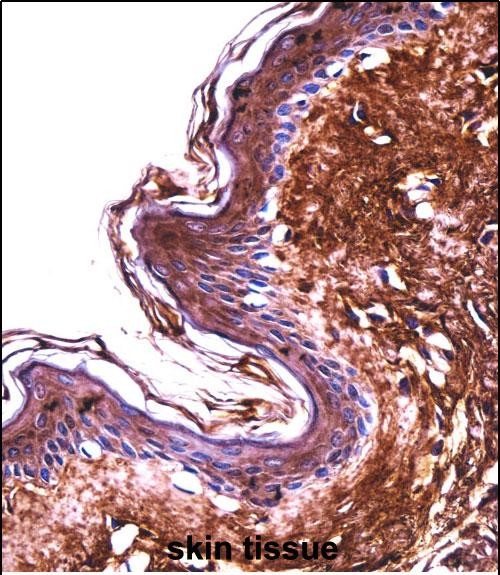PPT2 Antibody (Center)
Affinity Purified Rabbit Polyclonal Antibody (Pab)
- SPECIFICATION
- CITATIONS
- PROTOCOLS
- BACKGROUND

Application
| WB, IHC-P, E |
|---|---|
| Primary Accession | Q9UMR5 |
| Other Accession | NP_005146.3, NP_619731.1 |
| Reactivity | Human |
| Host | Rabbit |
| Clonality | Polyclonal |
| Isotype | Rabbit IgG |
| Calculated MW | 34225 Da |
| Antigen Region | 183-212 aa |
| Gene ID | 9374 |
|---|---|
| Other Names | Lysosomal thioesterase PPT2, PPT-2, 312-, S-thioesterase G14, PPT2 |
| Target/Specificity | This PPT2 antibody is generated from rabbits immunized with a KLH conjugated synthetic peptide between 183-212 amino acids from the Central region of human PPT2. |
| Dilution | WB~~1:1000 IHC-P~~1:10~50 E~~Use at an assay dependent concentration. |
| Format | Purified polyclonal antibody supplied in PBS with 0.09% (W/V) sodium azide. This antibody is purified through a protein A column, followed by peptide affinity purification. |
| Storage | Maintain refrigerated at 2-8°C for up to 2 weeks. For long term storage store at -20°C in small aliquots to prevent freeze-thaw cycles. |
| Precautions | PPT2 Antibody (Center) is for research use only and not for use in diagnostic or therapeutic procedures. |
| Name | PPT2 (HGNC:9326) |
|---|---|
| Function | Catalyzes the cleavage of thioester bonds from S-palmitoyl- CoA or S-palmitoyl-N-acetylcysteamine (unbranched structures) but does not have activity against palmitoylcysteine or palmitoylated proteins, branched structures or bulky head groups. Conversely, hydrolyzes both long and short chain fatty acyl-CoA substrate. |
| Cellular Location | Lysosome. |
| Tissue Location | Broadly expressed, with highest levels in skeletal muscle. |

Thousands of laboratories across the world have published research that depended on the performance of antibodies from Abcepta to advance their research. Check out links to articles that cite our products in major peer-reviewed journals, organized by research category.
info@abcepta.com, and receive a free "I Love Antibodies" mug.
Provided below are standard protocols that you may find useful for product applications.
Background
This gene encodes a member of the palmitoyl-protein thioesterase family. The encoded glycosylated lysosomal protein has palmitoyl-CoA hydrolase activity in vitro, but does not hydrolyze palmitate from cysteine residues in proteins. Three transcript variants encoding different isoforms have been described for this gene, with one of the isoforms being inactive. [provided by RefSeq].
References
Hancock, D.B., et al. Nat. Genet. 42(1):45-52(2010)
Barcellos, L.F., et al. PLoS Genet. 5 (10), E1000696 (2009) :
McKinnon, E., et al. Diabetes Obes Metab 11 SUPPL 1, 92-100 (2009) :
Lamesch, P., et al. Genomics 89(3):307-315(2007)
Sleat, D.E., et al. Mol. Cell Proteomics 5(4):686-701(2006)
If you have used an Abcepta product and would like to share how it has performed, please click on the "Submit Review" button and provide the requested information. Our staff will examine and post your review and contact you if needed.
If you have any additional inquiries please email technical services at tech@abcepta.com.













 Foundational characteristics of cancer include proliferation, angiogenesis, migration, evasion of apoptosis, and cellular immortality. Find key markers for these cellular processes and antibodies to detect them.
Foundational characteristics of cancer include proliferation, angiogenesis, migration, evasion of apoptosis, and cellular immortality. Find key markers for these cellular processes and antibodies to detect them. The SUMOplot™ Analysis Program predicts and scores sumoylation sites in your protein. SUMOylation is a post-translational modification involved in various cellular processes, such as nuclear-cytosolic transport, transcriptional regulation, apoptosis, protein stability, response to stress, and progression through the cell cycle.
The SUMOplot™ Analysis Program predicts and scores sumoylation sites in your protein. SUMOylation is a post-translational modification involved in various cellular processes, such as nuclear-cytosolic transport, transcriptional regulation, apoptosis, protein stability, response to stress, and progression through the cell cycle. The Autophagy Receptor Motif Plotter predicts and scores autophagy receptor binding sites in your protein. Identifying proteins connected to this pathway is critical to understanding the role of autophagy in physiological as well as pathological processes such as development, differentiation, neurodegenerative diseases, stress, infection, and cancer.
The Autophagy Receptor Motif Plotter predicts and scores autophagy receptor binding sites in your protein. Identifying proteins connected to this pathway is critical to understanding the role of autophagy in physiological as well as pathological processes such as development, differentiation, neurodegenerative diseases, stress, infection, and cancer.



